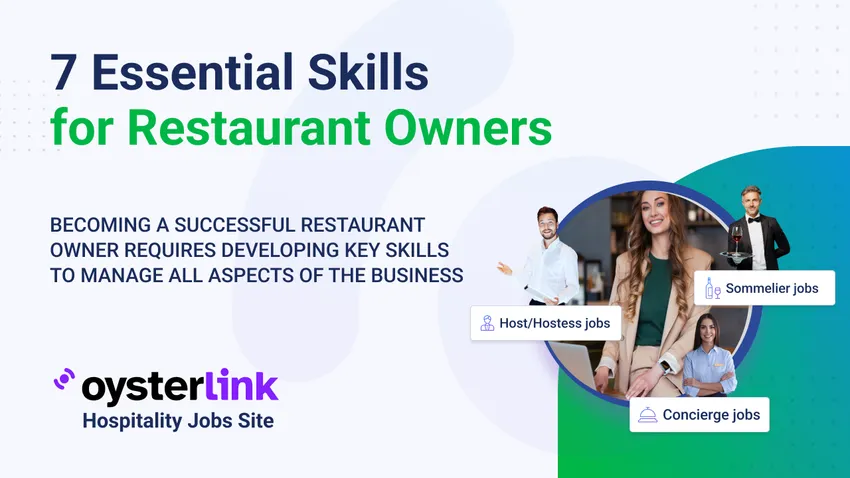Becoming a restaurant owner is an exciting goal, but it’s also a complex journey.
Success doesn’t just depend on a tasty menu or a stylish space — it's about having the right skills to manage every aspect of your business.
Here are the top seven skills every aspiring restaurant owner should develop to thrive in this industry:
1. Business and Financial Management
When it comes to running a restaurant, one thing is certain — it’s a business.
Even if you’re passionate about food and hospitality, you’ll need to understand how to manage the numbers.
Budgeting and financial planning
The first skill to focus on is budgeting and financial planning. As a restaurant owner, you’ll need to ensure that your business is profitable, and that requires careful tracking of costs.
From inventory and food costs to wages, utilities and marketing, every aspect of your restaurant impacts your bottom line.
Knowing how to calculate profit margins and adjust your pricing strategy accordingly will make all the difference.
Taxes and accounting
Handling taxes and accounting is an area where many owners face challenges without the right systems in place.
Beyond simply paying taxes at the end of the year, you’ll need to maintain accurate records throughout the year.
This includes managing payroll taxes, sales tax and understanding business deductions.
Working with an accountant is highly recommended to help you navigate complex tax laws and ensure compliance.
Scaling your business
Scaling the business requires a mindset shift. If your restaurant is thriving and you’re ready to grow, you’ll need to know how to scale effectively without losing quality or customer service.
This involves smart decisions regarding staffing, expanding your offerings and potentially opening additional locations.
2. Leadership and Team Management

Running a successful restaurant isn’t just about you — it’s about the team you lead.
Leadership and team management are essential for creating a positive work environment, ensuring smooth operations and achieving long-term success
Hiring and retaining the right people
One of the most important skills needed to be a restaurant owner is knowing how to hire and retain the right people.
Great restaurants are built by great teams, and finding employees who are skilled, motivated and fit your company culture can make all the difference.
Training and development
Training and development is another key aspect of leadership. When you hire new employees, it’s not just about getting them to show up on time — it’s about preparing them to succeed.
Offering effective training programs that teach everything from customer service to food safety ensures that your staff delivers the best experience to your customers.
As your restaurant grows, it’s crucial to foster a culture of continuous learning, where employees are encouraged to grow and develop new skills.
Conflict resolution and maintaining morale
Conflict resolution is a skill every restaurant owner needs to master. In any fast-paced environment, tensions can run high, whether it’s between employees or with customers.
Knowing how to step in and mediate disputes, find solutions and maintain a positive work environment is key to keeping your restaurant running smoothly.
A strong leader keeps morale high even when challenges arise.
3. Marketing and Customer Relationship Management
In the restaurant business, getting customers in the door and making sure they keep coming back is key.
That’s where marketing and customer relationship management come in.
Creating a strong brand
To start, you’ll need to create a brand that connects with your target audience.
Whether your restaurant focuses on fine dining, fast casual or a specific cuisine, your brand identity should reflect your mission and vision.
This can include everything from the restaurant's logo and colors to the tone of your social media posts.
Building an effective marketing strategy
To drive business, you’ll need to create an effective marketing strategy. This can include a mix of online and offline tactics — from social media advertising and influencer partnerships to local promotions and events.
Understanding where your customers spend their time — whether that’s on Instagram, Yelp or food blogs — is vital in deciding where to focus your marketing efforts.
Fostering customer loyalty
Once you’ve got customers through the door, customer retention becomes the next challenge.
Loyal customers can make or break your business, so creating a great experience for them is crucial.
Here are a few effective ways to keep them coming back:
- Offer loyalty programs to reward repeat customers
- Create memorable dining experiences that go beyond the meal
- Build relationships through personalized service tailored to individual needs
- Use customer feedback — both positive and negative — to improve your offerings and show that you value their opinions
Staying on top of trends
Staying on top of market trends is also important. The food and beverage industry is constantly evolving, with new trends emerging all the time.
From plant-based menus to sustainability efforts, being adaptable and open to innovation helps ensure your restaurant stays ahead of the curve.
4. Operational and Organizational Skills

Owning a restaurant means juggling a variety of responsibilities, and the ability to stay organized is crucial.
Time management and efficiency
You’ll need to balance daily operations, staffing, inventory, marketing and customer service — all while keeping an eye on your financials.
Being able to delegate tasks and manage time effectively is essential to running a smooth operation.
Problem-solving and decision-making
Restaurant owners also need problem-solving and decision-making abilities. Every day brings new challenges — from a broken piece of kitchen equipment to a sudden staff shortage.
As an owner, you’ll be expected to make quick decisions and resolve issues efficiently without letting them impact the customer experience.
Inventory and supply chain management
On the operational side, managing your inventory and supply chain is also critical.
Keeping your kitchen stocked with quality ingredients and maintaining relationships with suppliers ensures that your menu runs smoothly and you avoid running out of key items.
It’s essential to keep waste to a minimum and manage stock levels effectively to avoid unnecessary costs.
5. Knowledge of the Legal and Regulatory Environment
The restaurant business is highly regulated, and understanding the legal and regulatory environment is a non-negotiable skill for any restaurant owner.
Health and safety standards
Health and safety standards are non-negotiable and must be upheld at all times.
This includes strictly following food safety protocols, complying with local health regulations and scheduling regular inspections for your restaurant.
Neglecting these standards can lead to hefty fines or, worse, the closure of your business.
Licenses and permits
In addition to health codes, restaurant owners must also manage licenses and permits. These may include business licenses, food establishment permits, liquor licenses (if applicable) and music licenses.
Managing the intricacies of obtaining and renewing these licenses can be challenging, but it’s crucial for keeping your doors open and ensuring legal operation.
Understanding labor laws
It’s also important to have a good understanding of labor laws and employee rights.
Knowing your obligations regarding minimum wage, overtime pay and workers' compensation helps you avoid legal issues down the line.
6. Adaptability and Crisis Management

The restaurant industry is full of unpredictable challenges, which is why adaptability and crisis management are critical skills for owners.
Navigating economic challenges
Economic fluctuations, such as rising food costs or reduced customer spending, can heavily impact a restaurant's profitability.
A flexible mindset allows you to identify solutions, such as adjusting portion sizes, renegotiating supplier contracts or introducing promotions to attract budget-conscious customers.
Crisis communication
When unforeseen issues arise, clear and honest communication is essential. If you’re dealing with a customer-facing issue, such as a food safety concern, it’s important to address it immediately.
Likewise, if an internal problem like employee dissatisfaction arises, handling it transparently will help maintain trust.
Embracing change
The ability to pivot quickly and embrace change is a hallmark of resilient restaurant owners. For example, during the pandemic, many restaurants shifted to delivery and curbside pickup models.
Owners who proactively explored new revenue streams, such as virtual cooking classes or merchandise sales, found ways to stay afloat during uncertain times.
Stress management
Finally, stress management is a skill that will serve you well as a restaurant owner. Long hours, tough decisions and high stakes can take a toll, so it’s important to find ways to manage stress and avoid burnout.
7. Passion for the industry and vision
Finally, one of the most important skills needed to be a restaurant owner is a genuine passion for the industry.
Owning a restaurant requires immense dedication. Your passion for food, service and hospitality will be the driving force that keeps you motivated during challenging times.
Passion is contagious — your love for what you do will inspire your staff and resonate with your customers.
Alongside passion, having a long-term vision for your restaurant is crucial. You need to have clear goals and a direction for where you want your business to go.
This could be expanding into new markets, opening additional locations or continuing to innovate in terms of your offerings.
See also: Restaurant Owner Responsibilities
Elevate Your Career with Support from OysterLink
Running a restaurant is no easy task, but with the right skills, you can turn your passion for food and hospitality into a successful business.
The skills needed to be a restaurant owner are diverse and require a balance of leadership, financial management, marketing and problem-solving.
It’s not just about having a love for cooking or serving — it’s about managing a complex, fast-paced operation with a clear vision and strategy.
As you prepare for the challenges of restaurant ownership, it’s important to equip yourself with these essential skills.
OysterLink, a platform dedicated to helping professionals in the restaurant industry, offers resources such as career advice and interviews with successful restaurant owners to help you navigate your journey.
Whether you’re just starting out or looking to take the next step in your career, OysterLink is here to support your journey.










Loading comments...